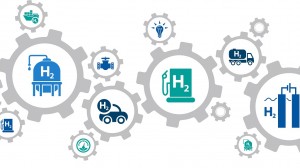The South West’s first manufacturing plant for sustainable green hydrogen is to be opened by the University of Bath as it strengthens its position as a leading research body into alternative low carbon fuels.
The plant is to be sited at the university’s new £70m motor industry global centre of excellence, which aims to put the West of England at the centre of research into next-generation ultra-low emission vehicles.

By producing the fuel, the pioneering Institute of Advanced Automotive Propulsion Systems (IAAPS) on the Bristol & Bath Science Park, pictured, and the university will be at the forefront of hydrogen research and innovation, including in areas such as aviation and marine transport that cannot easily use electric power.
Green hydrogen is made by splitting water by electrolysis using renewable power into hydrogen and oxygen.
The oxygen can be released into the atmosphere with no negative impact while the hydrogen can be used for clean heat and power – making it an ideal fuel to help meet the government’s net zero targets.
A number of British companies, including ITM Power, Johnson Matthey and Ceres Power, are already producing small amounts of green hydrogen – although most future plants are earmarked to open in coastal locations near offshore wind farms.
The University of Bath said the new hydrogen production and storage facility, which will start operating next spring, will enable it to forge leading strategic partnerships and play a vital role in the adopting sustainable fuels in the transport and built environment sectors.

The plant is being funded from a £2.5m bid made by the university to the UK Research Partnership Innovation Fund (RPIF).
It will allow IAAPS, which formerly opens this summer, to sustainably produce the gas for its research and testing work.
This will include:
- Decarbonising the energy used on the IAAPS site by reducing the whole of the 13,500 sq m building’s carbon footprint, helping toward the transition to net zero
- Supporting vital research and innovation into sustainable propulsion technologies and the use of hydrogen as an alternative green energy to achieve net zero targets, in particular in the hard-to-electrify sectors such as aviation, marine, off-highway and heavy-duty transport
- Acting as a regional and national demonstrator for local green energy generation and use, as well as a catalyst for the adoption of hydrogen across a wide range of applications.
The university sees the plant as a key area in developing IAAPS as a world-leading centre of excellence for research, innovation, enterprise and education, supporting the future direction of the transport industry and the transition towards net zero.
It will also form the basis of a regional hydrogen and sustainable transport acceleration hub in the West of England, which is already positioning itself as the UK’s lead region for research into how the fuel can transform the economy – not just in transport but also for heating and powering homes, workplaces and public buildings.
More than 30 cross-sector partners are already involved in looking at how hydrogen can stimulate green growth in the region while also providing a vital link to the national hydrogen research infrastructure.
The university also said IAAPS’ hydrogen production and research facilities would support an important outcome of COP 26, the Breakthrough Agenda, and its ambitious goals to dramatically fast-track the deployment of clean technologies to meet climate change targets.
At the same time it will strengthen the UK government’s Hydrogen Strategy to ensure affordable, low-carbon hydrogen is broadly available by 2030.
IAAPS academic director Prof Chris Brace said: “IAAPS is already widely recognised as a collaborative hub for research and innovation, and a partner of choice for both private and public sector clients covering the breadth of the transport industry.
“In working with a diverse range of organisations, including industry leaders, innovators, academics, legislators and SMEs, we are setting the pace in the adoption of net zero technology by a much broader range of stakeholders.
“The IAAPS team boasts a strong track record of delivering impactful research with real-world application, and I am confident that the green hydrogen facility is not only an important expansion of our remit and research and innovation portfolio, but also brings value to the industry as a whole and significantly advances the technologies needed to transition to a net zero society and economy.”
Last month Bath Business News reported how the University of Bath is hosting an important new research project into how the UK could increase its use of alternative liquid fuels and hydrogen as part of its commitment to reaching net zero in 2050.
Headed by Prof Tim Mays from the university’s Department of Chemical Engineering, the project is looking into the challenges blocking the wider use of low carbon fuels in the UK. It is funded by UK Research and Innovation (UKRI) aimed at tackling the research.



















